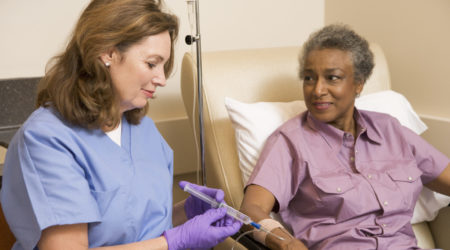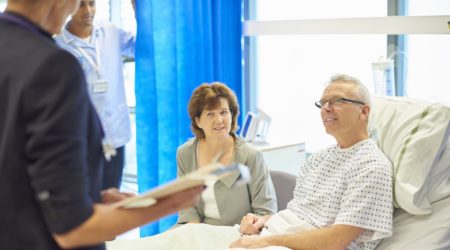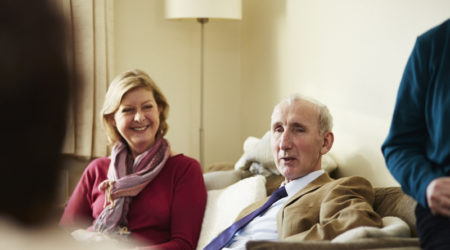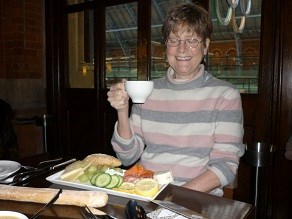
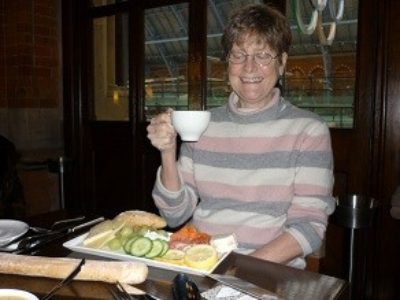
Hilary
Hilary, 56 when diagnosed with inoperable pancreatic adenocarcinoma in August 2011- following chemo-radiotherapy had a Whipples in 2012.
I was diagnosed in August 2011 (adenocarcinoma at the head of the pancreas) because I went yellow with jaundice, and was told my bile duct was blocked. Initially the medical team thought that they could operate to remove it but when they tried, in September 2011, they found that the cancer was too far advanced and was curled around the portal vein. They did give me a palliative by-pass operation to help my digestion as the tumour grew. I was told that my condition was terminal and that I would have treatment that would be palliative not curative and I could live for a year or maybe two.
I had four cycles of chemotherapy – Gemcitabine and Capcitabine, and then six weeks of combined radiotherapy and Capcitabine, and it was hard going as I felt quite tired and listless with a poor appetite, especially when I was on radiotherapy. I had an acute inflammatory reaction to the radiotherapy so I had to take painkillers throughout the treatment. The treatment finished at the end of April 2012 and then I started to gain strength and feel better. I had a wonderful summer, going to the Olympics and my nephew’s wedding, and making the best of the time left to me. I had scans every three months and was told that the tumour was staying more or less the same, which was a good result and keeping it contained.
In October 2012 I had a scan and was told that the tumour had shrunk and then a couple of weeks later they told me that they thought it was operable, but with no guarantee of success. I had a Whipple’s re-section (second attempt) in November and it all went successfully. What is more, when I went to the follow-up clinic the surgeons told me that the analysis of the tumour mass showed that all the cancer had disappeared and there was no cancer in the surrounding lymph nodes. I am now on regular monitoring but do not need further treatment.
It has been an astonishing journey and quite hard to cope with, both the bad news and the good news. I thought I was going to die quite soon, but I have been lucky and have been given some more years to live. It has been an extraordinarily emotional time for me and my family and has changed us. I think we are closer because we have had to share some very hard times together.
January 2013
Hilary’s experience of having chemo-radiation
I underwent 28 sessions of radiotherapy in March and April 2012, and the plan was to have daily capcitabine tablets with it. However from halfway through the treatment my liver test results caused the doctors concern – they said my liver was ‘struggling’, so I came off the tablets for one week, and was on half the original dose for the remainder of the treatment.
The radiotherapy consultant described the treatment as ‘consolidating’, but had shown some benefit to patients so she was recommending it in my case of locally advanced pancreatic cancer, after I had received four months of chemotherapy with gemcitabine and capcitabine. The treatment I had received before the chemo-radiation had kept the tumour more or less the same size as it was at the beginning.
I had to go to the hospital for a scan to prepare for the radiotherapy and to have little dots tattooed on me so that the machinery could be aligned properly for each treatment. This was fine, and the actual treatments all went smoothly and I soon got into the habit of them. My sessions were usually quite early in the morning, about 8.15 or 8.30 and I had kind people to give me lifts to the hospital, stay with me and bring me back.
I was told beforehand that the effects were cumulative and that the side effects would build up. I was not happy when on day 3 I was in considerable pain along the line across my body where the radiotherapy treatment was delivered. I told the nurses at the session and they got me to see a doctor straight away. The doctor said that I had an acute inflammatory reaction to the treatment and I should take pain killers. I was worried that the pain would get worse throughout the treatment but in fact it just stayed about the same and I took paracetamol and tramadol and persevered with it. I stopped taking the painkillers as soon as the treatment finished, and although I still have some soreness in the same line across my body, I do not need painkillers. It particularly hurts when I cough and sneeze, and I have been told that this is due to the scar tissue that forms in the healthy tissue after radiotherapy.
Going to hospital every day is very dispiriting and completely dominates your life while it is happening. I felt depressed during my treatment and lost my appetite. I felt tired and listless and often went back to bed as soon as I came home from the hospital. I bought ready meals (which I don’t usually eat) because they were easy and didn’t need me to think too hard about what to eat or how to prepare the meal.
As soon as the treatment finished I felt better and my appetite returned after about two or three weeks. After about a month I had a real feeling of well-being as my body healed itself after the treatment ended, and it was so nice not to have to keep going to the hospital.
January 2013
Hilary’s experience of taking care of herself
Taking care of yourself when you are diagnosed with pancreatic cancer and throughout treatment is a tricky problem. Everyone responds differently, but I can relate a bit of what it was like for me and how I tackled this.
Taking care of myself was closely bound up with taking care of those around me. Being seriously ill is hard to come to terms with and knowing that your illness is causing terrible distress to the people close to you is difficult too. The people closest to me were my children (both in their twenties) and my two sisters. I found that it was important to be as honest as possible with them. I told them all the information I had and gave them all updates after every clinic appointment or test result. It was hard but it was better than keeping secrets from them.
I felt completely passive about my diagnosis, I could not do anything about it and I felt as though I was on a little boat in a river being carried along by the current, taking me away from the life I had known. After I had my first operation and I was told that I had a year or maybe two to live, I talked a lot about dying, especially to my children. I planned my funeral and decluttered my house in a really fierce way. I thought that my children would have to tidy up every single item in the house, and every single piece of paper, so the least I could do was to reduce the quantity of stuff there was. It was hard doing it but I felt good and somehow liberated afterwards.
I wanted information about what it would be like for me and for those caring for me as I deteriorated and I asked my consultant for information. He wasn’t very helpful, but my Macmillan nurse was much more informative. She didn’t seem to find the conversation difficult and understood that I wanted practical information about whether I would be able to look after myself, for how long, if I would have to move house, and what demands my ill health would place on those around me.
There is a Buddhist Centre near me and I signed up for a course called ‘Living Well with Pain and Illness’. It was quite useful and I found the meditation CDs helpful and have continued to use them occasionally. One of the best things about attending this course was being able to talk about my illness to other people who weren’t closely involved with me and so I could concentrate on my needs and not constantly thinking about the pain I was causing the others.
I had many offers of help from friends and I had to filter the offers. I had to sort out what sorts of help I wanted and who would be the best people to give it. Lots of people said they would do anything and I only had to ask, but I found it difficult to take up this kind of offer. I didn’t need much practical help as I had a cleaner and I did my shopping on-line. The best offer was from a friend who said she went dog-walking with a group of friends every Friday morning and she would come and pick me up so I could join them. It became a real high spot of the week and I went out with the dog-walkers even when I had to take my chemo pills with me, and when I couldn’t make it up the hill.
Being very ill makes all your relationships new and different and you have to work out how to communicate and how to behave with everyone you know in a new way. It’s difficult and tiring but there are rewards because you can find yourself closer to people and your priorities become clearer.
April 2013
